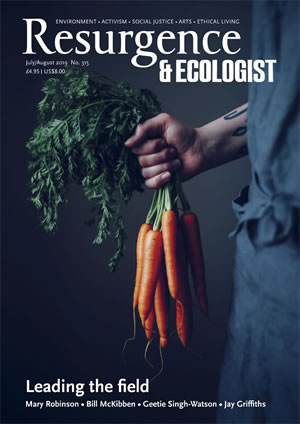Talking about climate change is hard, and perhaps no one knows this more than George Marshall, the author of Don’t Even Think About It: Why Our Brains are Wired to Ignore Climate Change. Marshall has spent many years on environmental activism and, more recently, on environmental communication, so I was keen to catch up with him to find out whether things have changed since the rise of grassroots activists Extinction Rebellion and key climate breakdown communicators like Greta Thunberg.
Marshall is enthusiastic but cautious: “I am inspired and excited about the upsurge of grassroots action. I see that as being the start,” he says. “In the end social movements are about activists as well as activism. I see coming through the growing youth mobilisation a small group who will become activists.”
Keeping the momentum going is crucial, but difficult. Late last year I was invited to speak on Good Morning Britain about the incoming single-use plastics ban, and whether this should be extended to balloons. Much as I care about the issue of plastic pollution, there’s no question that it pales in comparison to the looming tragedy that is climate breakdown. What’s happening with our climate means that a nuclear button has been pushed, but instead of responding to what this means, we are all too busy arguing about plastics and Brexit.
I ask Marshall what he makes of this. He tells me that he was initially sceptical of the latest IPCC report, which focuses on 1.5-degree warming: “My concern was that the conclusion would be that it’s too late… But actually it has opened up a new level of urgency from an activist point of view.”
Marshall recently completed work on the Alberta Narratives Project in Canada, where, he says, “climate change has, unusually, become one of the key hot topics for the election,” due to polarised views between conservative and liberal candidates on issues like carbon pricing. Marshall has previously worked on a guide to carbon pricing with the World Bank, and he says that what is happening in Canada is “interesting, and important how it’s playing out”.
Due to major wildfires in British Columbia, people in Canada are now much more convinced that climate breakdown is happening, but Marshall tells me, “We’re seeing a shift all around the world. It’s not massive, but a sustained year-on-year move in that direction. But the problem is that the connections people are making are not that strong.” He gives the example of abstract concerns about climate change, which do not translate into policy changes or behaviour changes for reducing emissions.
Marshall has worked across Canada delivering workshops to inform people about the climate crisis, and states that research shows that there are two primary audiences who are most concerned with the issues: women, and young people. He says this demonstrates “a real age shift in attitudes, and also in levels of engagement. Women were also [found to be] more concerned about climate change across the political spectrum.” However, in general climate discussion Marshall speaks of divided opinions that are preventing the dialogue from moving forward: “We need to break out of this completely toxic polarisation.” While this has applied to politics in western communities for some time, Marshall raises concerns that it is starting to happen elsewhere due to populist movements. For example, Germany is becoming more politically divided due to a far-right group made up of climate deniers – “charismatic populists who can be very dangerous for climate change”, he tells me, giving president Donald Trump as another example. Polarisation is an issue in Britain too: “Hard Brexiteers have a lot of political leverage and high profile, and many of them are active or passive climate deniers.”
I ask Marshall whether he thinks the growing discussion and activism around the climate crisis is enough to overcome some of these issues. There have been many attempts over the years to spark grassroots-based direct action on climate breakdown, and Marshall was involved in Rising Tide but found that “it just didn’t work – it was too early for public attention.” Other groups have risen and suffered similar fates, such as the Camp for Climate Action, and Plane Stupid. But, Marshall tells me, “the activism now is turning into something bigger because we have a cultural shift going on, thanks to extreme record-breaking weather events and the IPCC report.”
Marshall thinks change is inevitable, because the climate will continue to deteriorate. “There is a point at which incidents of extreme weather can push things. This is happening and will continue to happen. Something might happen that produces a significant shift in public attention. I don’t think it’s going to stop now. We haven’t seen this level of spontaneous grassroots mobilisation on this issue before. It’s pushing against an open door. But it only opens very slowly.”
Marshall also tells me it is possible that a city in the UK might hold climate negotiations next year, which will be the most important ones since Paris. Although the location has not yet officially been announced, it would be a major international event, he says.
As for activism, Marshall tells me, “This is the short game. The longer game is the same as it has been before, which is when and how we manage to broaden the base of public engagement. The activism will help with that but can also potentially fail to reach across the boundaries.” Indeed, polarisation plagues many political topics where debate becomes discouraged and identity politics can take over from reason. Marshall says we must “recognise different identities, especially politically. Radical movements have a potential to be more diverse than mainstream movements, as they have more control over their identity, but they can also be quite excluding.”
As a communications person, Marshall wants a movement where everybody can see themselves in climate solutions. “There’s a real need to engage with people on preparation and protection” – rather than adaptation – “preparing for the fact that the weather is changing. Then people are far more willing to hear expert opinion on what’s coming down the line, rather than just to discuss what’s causing it.”
Protection is important because it appeals to our intrinsic values – how do we protect our communities, our towns? How do we care for people who might be vulnerable and at risk? “This will lead people to take the underlying causes more seriously. We’ve tended as activists to soft-pedal on the adaptation thing because we think it undermines mitigation. But mitigation is hard to argue, because it’s complicated, and we need a range of approaches.” Either way, we need to act on the growing momentum of current movements, as Marshall says – youth Extinction Rebellion groups are doing amazing things, and Thunberg has a powerful voice, but Marshall points out: “We do not have time for a lot of these youth activists to grow up.”







